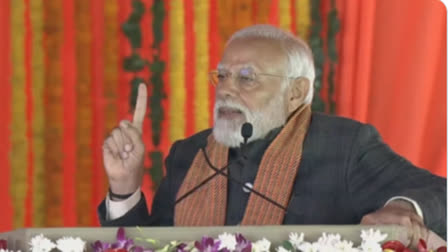Srinagar(Jammu and Kashmir): Prime Minister Narendra Modi visited Srinagar, the summer capital of Jammu and Kashmir on Thursday March 7, his first visit to the valley since the abrogation of Article 370, which gave a special status to the erstwhile state.
PM Modi addressed a rally at the Bakhshi stadium in Srinagar for the 'Viksit Bharat, Viksit Jammu Kashmir' program, unveiling a slew of development projects worth over Rs 6,300 crore. Here are the key takeaways from the PM's concise 28-minute speech:
'Kashmir Liberated from Chains, Deprivation Replaced by Inclusive Development':In his address,PM Modi shed light on the 'transformative journey of Kashmir', stating that the region was once “ensnared for the benefit of a select few dynasts”. PM Modi said that before the abrogation of Article 370, national laws didn't apply to Jammu and Kashmir, and welfare schemes failed to reach its people.
The Prime Minister said that the region, “previously deprived of the benefits of nationwide schemes”, has now emerged from the shadows. He said that the Congress and regional parties misled the nation on Article 370 which not only affected the people of Jammu and Kashmir but also influenced the entire nation's perspective on Article 370.
'Global Recognition for J&K's Success Story':PM Modi said that the “success story unfolding in Jammu and Kashmir will captivate global attention in the years to come”. Inaugurating several tourism-related development projects, he highlighted the “transformative potential of development, the vast possibilities in the tourism sector, the empowerment of farmers, and the leadership demonstrated by the youth in Jammu and Kashmir”.
Asserting that J&K is more than a region, the PM said that it is the “forehead of India”, adding that the priority of developing J&K aligns with the overarching vision of building a developed India. The Prime Minister said the path to prosperity and progress emerged from the combined forces of development, tourism, empowerment, and youth leadership in the region.
'Wed in India' to Boost Tourism in Jammu and Kashmir':Building on the success of the 'Make in India' initiative, PM Modi announced his next mission – 'Wed in India' encouraging people to choose Jammu and Kashmir as their wedding destination. PM Modi highlighted the region's growing appeal for tourism.
Reflecting on the significant transformation, he noted that there was a time when doubts were cast on the viability of J&K as a tourist destination. However, with tourism in the region breaking records, PM Modi pointed out that over two crore tourists visited J&K in 2023, showcasing the increasing popularity of the picturesque location.
The Prime Minister also cited the successful organization of the G20 summit in J&K as evidence of the region's capability to host major international events.
'Paving the Way for Developed Jammu and Kashmir':PM Modi dedicated a series of development projects that promise to elevate Jammu and Kashmir's growth trajectory. Addressing the gathering, PM Modi emphasized the significance of these projects in fostering the development of the region.
Highlighting the priority of a developed Jammu and Kashmir within the broader vision of a developed India, PM Modi declared Srinagar as the new hub of the country's tourism industry. He underscored the positive impact the developmental projects would have on the socio-economic landscape of the region.
In a strategic move to bolster horticulture, agriculture, and livestock husbandry, PM Modi inaugurated the 'Holistic Agriculture Development Programme,' a substantial initiative valued at Rs 5,000 crore. This comprehensive scheme aims to provide skill development to approximately 2.5 lakh farmers through a specialized Daksh Kisan portal and establish about 2000 Kisan Khidmat Ghars for the overall well-being of the agricultural community in Jammu and Kashmir.
'Inclusive Development in Srinagar':PM Modi reiterated that Jammu and Kashmir holds a special place as India's crown. Reflecting on past “disparities”, PM Modi highlighted the “transformative shift where schemes for the poor, once elusive in J&K, are now accessible, ensuring equitable development”.
